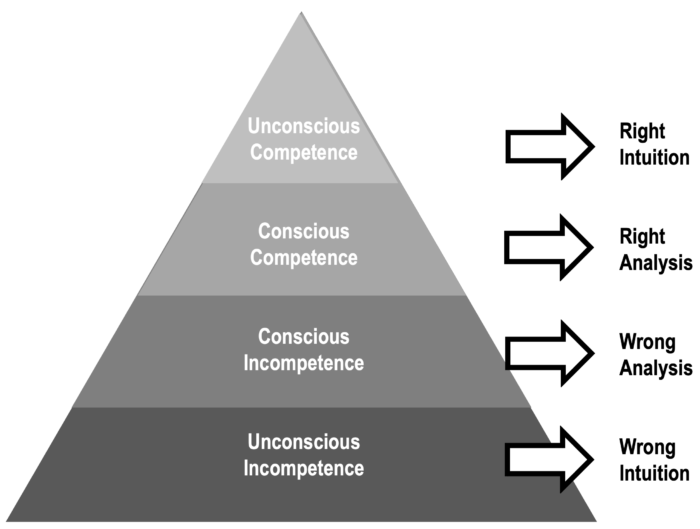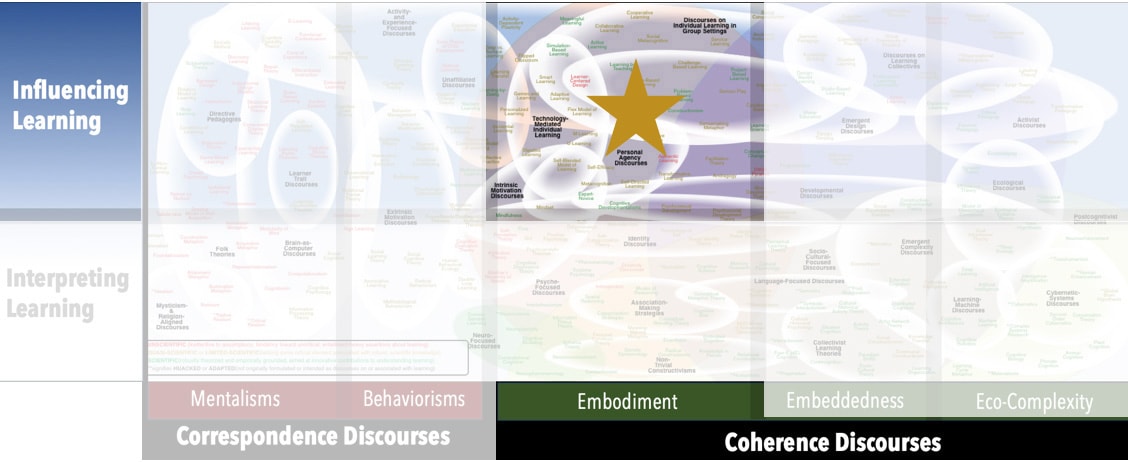AKA
Conscious Competence Ladder/Matrix/Model
Four Stages of Competence/Learning
Ladder of Learning
Learning Matrix
Focus
Moving from being unaware and unskilled to being effortless and skilled competenciesPrincipal Metaphors
Metaphors associated with learning are not explicitly stated within the Conscious Competence Learning Model. In our analysis, the Attainment Metaphor serves as the figurative ground of the model:- Knowledge is … a competence (typically involving challenge)
- Knowing is … manifesting competence
- Learner is … a climber (individual)
- Learning is … climbing; passing levels (arriving at, reaching, progressing, accomplishing, achieving)
- Teaching is … leading, guiding, orienting, facilitating
Originated
1960sSynopsis
The Conscious Competence Learning Model interprets the movement from unskilled to skilled in terms of four discrete stages:- Unconscious Incompetence – being unaware of an area or skill and/or not being aware of one's lack of competence in an area or skill. Unconscious Incompetence is associated with poor intuitions in relation to that area or skill.
- Conscious Incompetence – being consciously aware of one’s lack of skill or understanding in relation to a specific area or skill. Conscious Incompetence is often marked by poor analytical abilities in the area.
- Conscious Competence – having some level of fluency with a specific area or skill, along with some level of awareness of one’s level of (in)ability. Conscious Competence is associated with the development of sound analytic skills in the area.
- Unconscious Competence – being fluent in an area or able to use a skill without having to devote much conscious attention to it. Unconscious Competence is associated with reliable intuitions in relation to the area or skill.
 Sometimes arriving to the Conscious Competence level – that is, becoming aware that one is capable – has a feeling of suddenness to it. While such experiences are not formally part of the Conscious Competence Model of Learning, they are frequently highlighted as critical moments of learning:
Sometimes arriving to the Conscious Competence level – that is, becoming aware that one is capable – has a feeling of suddenness to it. While such experiences are not formally part of the Conscious Competence Model of Learning, they are frequently highlighted as critical moments of learning:
- Aha! Moment (Aha Experience; Aha Reaction; Eureka Effect; Eureka Moment; Surprise-Based Learning) – an emotionally charged moment in which one suddenly recognizes a significant improvement in understanding. Associated constructs include:
- Eureka Task – a problem designed to afford insight into the Aha! Moment
- Inspiration – in Cognitive Psychology, an Aha! Moment
- Sudden Insight – an abrupt, often unexpected realization of the truth and/or complexity of a situation
- Critical Learning Incidents (Critical Events in Learning) – moments of learning that one identifies as unusually effective, impactful, and/or meaningful (although not necessarily experienced as such in the moment)
- Ignorance Matrix (David Kerwin, 1990s) – a framework for categorizing different types of knowledge gaps, helping people understand the nature of ignorance and how it impacts learning, research, and problem-solving. For categories are posited:
- Unknown Unknowns – aspects of reality that humans aren’t aware of and don’t understand
- Known Unknowns – aspects of reality that humans are aware of but don’t understand
- Known Knowns – aspects of reality that humans are aware of and do understand
- Unknown Knowns – aspects of reality that humans aren’t aware of but nonetheless understand
- Five Orders of Ignorance (Phillip Armour, 2000s) – a framework for distinguishing among levels of ignorance in the contexts of software development, knowledge management, and learning strategies. The levels are:
- Zero Order Ignorance (0OI; Lack of Ignorance) – You know something and can apply that knowledge (Known Knowns).
- First Order Ignorance (1OI; Lack of Knowledge) – You don’t know something, but you know that you don’t know it (Known Unknowns).
- Second Order Ignorance (2OI; Lack of Awareness) – You don’t know that you don’t know something (Unknown Unknowns).
- Third Order Ignorance (3OI; Lack of Process) – You don’t know how to find out what you don’t know.
- Fourth Order Ignorance (4OI; Meta-Ignorance) – You don’t know about the Five Orders of Ignorance – or that ignorance is structured at all.
- Ignorance Map (University of Arizona Health Sciences, 2010s) – a conceptual framework that categorizes different types of ignorance in scientific and societal contexts, intended to help researchers and policymakers understand how ignorance is structured and how it can be used productively in decision-making and knowledge production. Several variations are in circulation, with the most common categories comprising:
- Known Unknowns – details we are aware that we don’t know
- Unknown Unknowns – details we don’t realize we don’t know. Subcategories include:
- Errors – the details we think we know but don’t
- Unknown Knowns – details we do know but that are not part of conscious awareness
- Taboo Knowledge – details that are ignored for cultural or moral reasons
- Denials – details too painful to allow into conscious awareness
- Nescience (1600s) – a state of not knowing, particularly when the unknown is beyond current understanding or unknowable. It is distinct from Ignorance because Ignorance often implies a lack of knowledge that could potentially be acquired, whereas Nescience suggests something is inherently unknowable or outside of human comprehension.
- Peter Principle (Laurence Peter, 1960s) – the suggestion/observation that, in hierarchical organizations, members tend to rise to their level of incompetence. That is, people are often promoted based on their success in their current roles, rather than their ability to perform the responsibilities of the new role – and so, eventually, they reach a position where they are no longer competent.
Commentary
The Conscious Competence Learning Model has been subject to relatively few criticisms – perhaps because it is descriptive rather than prescriptive. That is, it does not purport to tell learners or teachers what to do, it offers an after-the-fact interpretation of very different modes of competence that learners pass through.Authors and/or Prominent Influences
Martin M. BroadwellStatus as a Theory of Learning
The Conscious Competence Learning Model is a descriptive theory of learning, offering a typology of distinct modes of skillful action and awareness associated with developing competence.Status as a Theory of Teaching
The Conscious Competence Learning Model has is not a theory of teaching.Status as a Scientific Theory
Proponents of the Conscious Competence Learning Model tend to be inattentive to the metaphors of learning that they invoke, and consequently most prominent descriptions of the theory read like pop psychology. The perspective can be made to align with more robust perspectives on learning, but uneven (and oftentimes indefensible) descriptions render it inappropriate to describe the model as scientific. That said, the Conscious Competence Learning Model has recently gained some empirical support from Cognitive Science and Neuroscience research.Subdiscourses:
- Aha! Moment (Aha Experience; Aha Reaction; Eureka Effect; Eureka Moment; Surprise-Based Learning)
- Conscious Competence
- Conscious Incompetence
- Critical Learning Incidents (Critical Events in Learning)
- Eureka Task
- Five Orders of Ignorance
- Ignorance Map
- Ignorance Matrix
- Inspiration
- Known Knowns
- Known Unknowns
- Nescience
- Non-Knowledge
- Peter Principle
- Sudden Insight
- Taboo Knowledge
- Unconscious Competence
- Unconscious Incompetence
- Unknown Knowns
- Unknown Unknowns
Map Location

Please cite this article as:
Davis, B., & Francis, K. (2025). “Conscious Competence Model of Learning” in Discourses on Learning in Education. https://learningdiscourses.com.
⇦ Back to Map
⇦ Back to List
